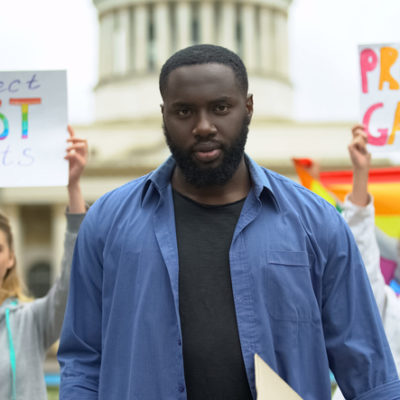on
Photo: Getty Images
Over 50 years since civil rights icon Martin Luther King Jr. galvanized millions across the country toward a dream of equality and integration, we are still fighting for what it means to have equity and across a spectrum of further marginalized identities.
What does it mean to be Black and queer in today’s reality? The Michigan Chronicle interviewed A. Nzere Kwabena, executive director of LGBT Detroit on the hallmarks of progress and how far we still have to go.
“We have lived with the HIV virus scare since 1980s,” said Kwabena. “Also, the flu and now with covid, another health crisis has been compounded on the others. We are here to participate in solutions, so we’re not done. COVID exposed a number of health disparities that needs to be addressed and have impacted a number of us losing family, friends and a sense of safety.”
Even before the COIVD pandemic hit, LGBTQ youth had a far higher risk of depression, anxiety, and suicide attempts, partly because they experienced more victimization. The minority stress model contends that repeated encounters with stigma, aggression, rejection, and prejudice can have a detrimental effect on mental health.
Additionally, LGBTQ kids already experience far higher than average rates of unemployment and homelessness. The pandemic caused mental stress, physical alienation, and financial stress have the potential to intensify these worries and give rise to new issues for many LGBTQ kids.
Founded in 1994, LGBT Detroit is a nonprofit organization focused on increasing public awareness and support of lesbian, gay, bisexual, and transgender individuals across the racial, cultural, and socio-economic spectrum.
The nonprofit centers their work on creating a sense of community for anyone who has been discriminated against based on their gender identity or sexual orientation. LGBT Detroit’s services include several educational campaigns launched statewide, including “Togethr”, a podcast dedicated to ending the stigma and misinformation of HIV and AIDS; and “Brother To Brother Lockdown” is an video podcast for safe sex and HIV education and prevention program.
Also, the organization hosts an LGBT Detroit Leadership Academy for Mentors and Protégés, a program for mentoring kids and young adults now in its 10th year. The LGBT Detroit Leadership Academy (The Academy) creates a transparent and long-lasting road map to find and cultivate future leaders in the LGBT+ community.

One of the biggest LGBT+ events of the year is Hotter than July, a Black Pride week-long celebration.
Started in 1996 to celebrate Detroit’s Black LGBT+ community, Hotter Than July summer event is known as the world’s second oldest Black LGBT+ Pride with over 9,000 attendees noted in 2019. Organized by LGBT Detroit, the activities are curated in partnership with community leaders and supporters to offer a safe, education space to celebrate and showcase the culture in the city.
When asked what equity means for the Black LGBT+ community in Detroit, Kwabena said equity is being able to be free in who you are.
“We need to create more spaces where people don’t have to leave a space to be free. We need to make more environments more welcoming,” said Kwabena. “Most people are ignorant of our culture, and although we have seen big cultural shifts forward and I have witnessed them in my lifetime, we have also seen a way of going backward. I’ve seen progress and want to build on the acceptance and rise in allyship around us.”
Next year will mark the 30th anniversary of LGBT Detroit and Kwabena said the organization’s is working toward creating regional, statewide survey to ask what the equal rights movement looks today and what significant achievements stand out as landmarks to safeguard and build on to individuals.
“Detroit has seen a tremendous amount of progress when it comes to the downtown area,” said Kwabena. “We have rallied to have downtown show the representation of safe space for everyone and its been more welcoming. However, some other areas of the city still need attention. I’m afraid we still have only certain areas, like downtown, that we can only express ourselves here but can’t express yourself in other places.”
He said in terms of social policy, there are assets that have been hard fought that need to be protected.
“We want still for the ability of Black and Brown people, inside and outside the LGBT community to gather around resources and the power that is available to make sure the rights we do have remain. We look at how the Supreme Court reversed reproductive justice overnight and there was a rallying around the country. We are far from feeling like we are where we need to be and can be.”
Join our email list to stay connected.






